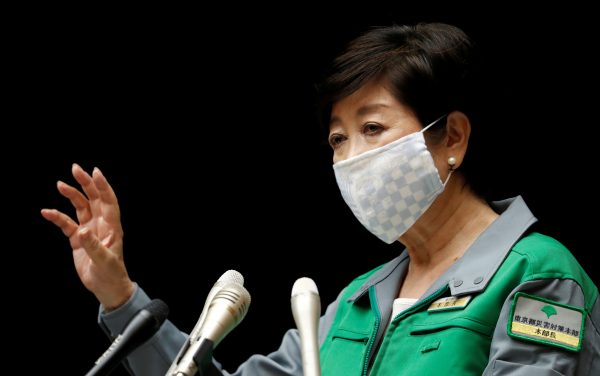Her main opponent Kenji Utsunomiya had the backing of the major opposition Constitutional Democratic Party and the Japanese Communist Party. But the 73-year-old former head of the Japan Federation of Bar Associations only garnered 13.76 per cent of the vote, down from the 20.2 per cent in his 2014 campaign for governor. Former actor Taro Yamamoto, who leads the Reiwa Shinsengumi party, placed third with 10.72 per cent of the vote. He had campaigned on cancelling the Olympics and redirecting funding to those affected by the COVID-19 pandemic.
Meanwhile, Koike remains committed to hosting a safe Olympic and Paralympic Games, which have been postponed to July 2021, to help unify the world in overcoming the pandemic. She is promoting a scaled back Olympics at minimal cost, with reduced events, limited spectators and few, if any, international tourists.
But the Tokyo Organising Committee have provided few details on how the Games will proceed, especially if a vaccine is not ready by 2021. As the economy falls deeper into its worst post-war recession, a majority of Tokyo residents would prefer the Olympics to be further postponed or cancelled altogether.
Koike’s victory came despite a recent spike in COVID-19 infections in Tokyo, the epicentre of the pandemic in Japan. Since the national state of emergency was lifted in late May, daily cases reached a record of 366 on 23 July. There are now over 10,000 cases in Tokyo, accounting for over a third of Japan’s total infections (surpassing 27,000). This has forced Koike to declare the highest level of alert.
The former newscaster and cabinet minister still enjoys high approval ratings for her handling of the COVID-19 outbreak. This has overshadowed her failure to achieve her policy goals of reducing overwork and commuter congestion and improving childcare and elderly care. Koike’s articulate, confident and direct public communication, with frequent press conferences and extensive use of social media, has outshone the often erratic and lacklustre response of the national government, led by the increasingly unpopular Prime Minister Shinzo Abe.
There is now speculation about whether Koike will return to national politics, potentially becoming Japan’s first female prime minister, although she currently denies any such plans. Shinzo Abe is set to step down in September 2021, when he completes his unprecedented third term as leader of the conservative Liberal Democratic Party (LDP). The longest serving prime minister in Japanese history, Abe’s approval ratings have plunged amid the tanking economy, his government’s muddled and uninspiring handling of the COVID-19 pandemic and recurring political scandals.
Despite her popularity, Koike would face challenging obstacles. She would first have to step down as governor and contest a seat in the lower house of the National Diet (parliament) when the next national election (due by October 2021) is called.
Koike has a long history of hopping between parties, having been a member of seven different conservative and populist parties since she was first elected to the Diet in 1992. She joined the LDP in 2002, entered the cabinet as Environment Minister in 2003 and became Japan’s first female Defence Minister in 2007. She failed in a bid to become LDP leader in 2008 and resigned from the Diet in 2016. Koike won the election to become Tokyo’s governor in 2016, defeating the LDP’s chosen candidate.
Despite the LDP backing her recent re-election, its senior politicians — already jostling to succeed Abe — would be unlikely to welcome her back into the party. As well as her party-jumping, they could drag up old scandals, such as the allegation that she faked receiving a degree from Cairo University in the 1970s, which she denies.
Alternatively, Koike could again launch a new national party from scratch. Unprepared for the snap national election called by Abe in October 2017, she hurriedly founded her first attempt at a national political vehicle, the Party of Hope (PH). This was cobbled from a splinter group of the former main opposition Democratic Party. But the PH fractured over Koike’s conservative stance on national defence and changing the constitution, winning only 50 seats out of the 465-member House of Representatives, with around 20 per cent of the vote.
After this disappointing debut, the following year the PH merged with remnant Democratic Party members to form the Democratic Party for the People, leaving just two PH members in the current Diet. Koike’s local party, Tokyoites First, has been more successful in holding power in the Tokyo Metropolitan Assembly. Since the July 2017 local elections it has been in coalition with Komeito, the national coalition partner of the LDP.
Upgrading this power base into a national party would be another risky political gamble, switching from a regional to a national policy agenda. Koike may struggle to differentiate her political brand, as her assertive nationalism is similar to Abe’s, and her preference for government assistance to boost business and the economy is also similar to the LDP. When her second term as governor ends in 2024, Abe’s successor — whoever that may be — will be due to seek re-election. This may be a more opportune time for Koike to seek her ultimate political goal.
Craig Mark is Professor of International Studies at Kyoritsu Women’s University, Tokyo.

